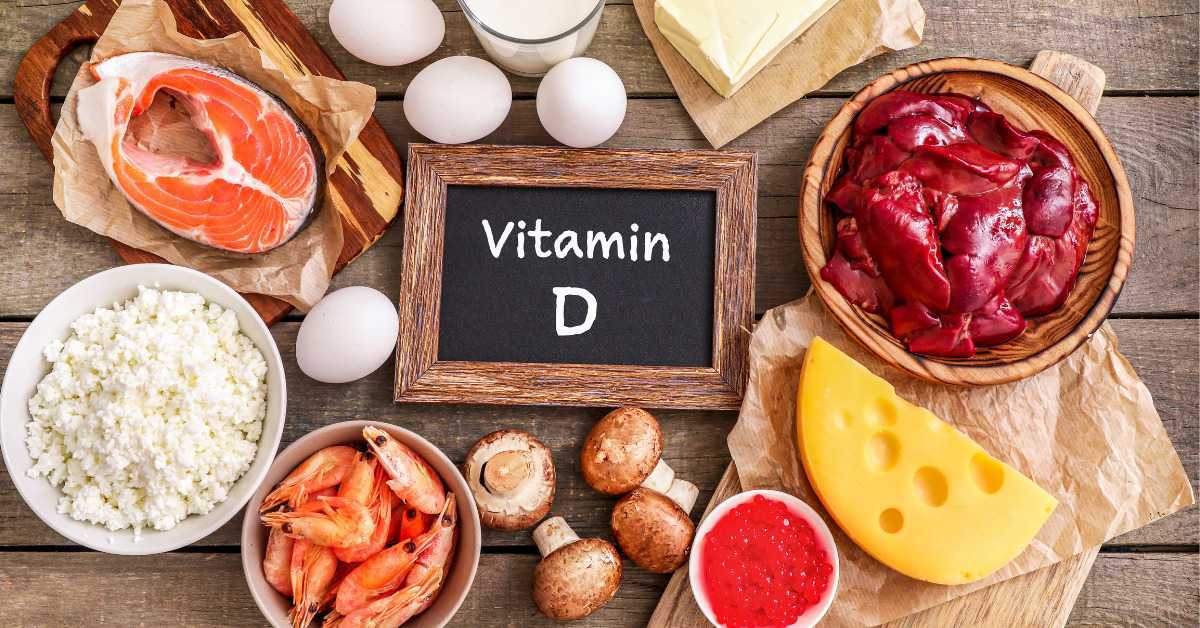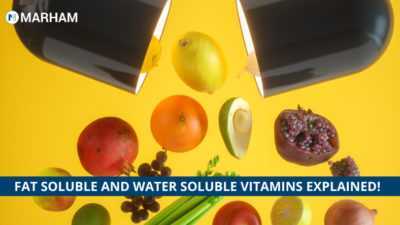Do you know the difference between water-soluble and fat-soluble vitamins? If not, don’t worry – you’re not alone. Many people are unaware of the distinction between these two types of vitamins.
In this blog post, we will break down each type and explain how they differ from each other. We will also provide a comprehensive guide on which vitamin is water soluble and which is fat soluble!
Difference Between Water Soluble and Fat Soluble Vitamins
Water soluble vitamins are those that dissolve in water. They are not stored in the body and need to be replenished regularly. Fat soluble vitamins are those that dissolve in fat. They can be stored in the body for long periods of time.


There are several key differences between these two types of vitamins:
- Water soluble vitamins are not stored in the body, while fat soluble vitamins can be stored for long periods of time.
- Water soluble vitamins need to be replenished regularly, while fat soluble vitamins do not need to be replenished as often.
- Water soluble vitamins are absorbed more quickly by the body, while fat soluble vitamins are absorbed more slowly.
Now that we’ve explained the difference between water soluble and fat soluble vitamins, let’s take a look at which vitamins are water soluble and which are fat soluble.
So, Which Vitamin is Water Soluble and Which is Fat Soluble?
- Water soluble vitamins include vitamin C and all of the B vitamins. These vitamins are found in fruits, vegetables, and grains. They are also added to some foods, such as fortified cereals.
- Fat soluble vitamins include vitamin A, vitamin D, vitamin E, and vitamin K. These vitamins are found in fatty foods, such as milk, butter, and eggs. They are also found in some plants, such as broccoli and spinach.
Water Soluble Vitamins:
In this section we have briefly explained water soluble vitamins C and B complex:
1. Vitamin C
Vitamin C is a water-soluble vitamin that is found in many foods, especially fruits and vegetables. The recommended daily intake (RDI) for vitamin C is 60-90 mg/day for adults.


Some of its benefits include:
- Boosting the immune system
- Aiding in the absorption of iron
- Promoting wound healing
- An important antioxidant that helps protect cells from damage
- It may help prevent some chronic diseases such as heart disease and cancer
While our bodies need vitamin C to function properly, we can only store a small amount of it. This means that we need to get vitamin C from our diet every day.
Foods High in Vitamin C
There are many foods that are high in vitamin C, including:
- oranges
- grapefruits
- lemons
- strawberries
- broccoli
- kale
- Brussels sprouts
According to research, Vitamin C is an essential nutrient that most people should be able to get from their diet. However, some people may need to take supplements to ensure they are getting enough.
2. B vitamins (thiamine, riboflavin, niacin, pantothenic acid, biotin, folic acid, B12)
B vitamins are essential nutrients that play a key role in many of the body’s most important functions. While all B vitamins are important, some of the most well-known include vitamin B12, folate (vitamin B11), and niacin (vitamin B13).


Some important benefits of B vitamins are:
- Vitamin B12 plays a vital role in the formation of red blood cells, the maintenance of the nervous system, and DNA synthesis.
- Vitamin B11 (folate) is important for pregnant women because it helps to prevent birth defects in the brain and spine.
- Vitamin B13 (niacin) is important for energy production and cell health.
- Thiamine or B1 is important for the proper function of enzymes involved in energy production and metabolism.
Foods High in Vitamin B:
- leafy green vegetables
- legumes
- nuts and seeds
- whole grains
- eggs
- dairy products
- poultry
- fish
While we can get some B vitamins from our diet, others are only available through supplementation. If you think you may be deficient in any of the B vitamins, talk to your doctor or a registered dietitian to find out if supplementing is right for you.
Also, check out 20 Best Multivitamins in Pakistan 2022.
Fat Soluble Vitamins:
Below we have given a brief explanation of the benefits, food sources, intakes, and functions of fat soluble vitamins:
1. Vitamin A
Vitamin A is a group of unsaturated nutritional organic compounds that includes retinol, retinal, and beta-carotene. The recommended daily intake of vitamin A is 900 micrograms for men and 700 micrograms for women.


Vitamin A has multiple functions:
- It helps keep skin and mucous membranes moist
- It protects against infections
- It aids in the production of white blood cells.
- The body needs vitamin A to produce rhodopsin, a pigment that absorbs light in the retina. Without vitamin A, vision deteriorates and can eventually lead to blindness.
Foods High in Vitamin A
- eggs
- milk
- liver
- dark leafy green vegetables
- orange and yellow vegetables
- fortified cereals.
Lack of Vitamin a can cause night blindness which is why it is extremely crucial to take recommended amounts daily.
2. Vitamin D
Vitamin D is a water soluble vitamin found in some foods that is needed for health and to maintain strong bones. The body also needs vitamin D to absorb calcium. Vitamin D can be obtained from food, supplements, or exposure to sunlight.


Some benefits of Vitamin D are:
- It helps the body absorb calcium, which is needed for strong bones and teeth.
- Vitamin D also plays a role in immune function, cell growth, and the reduction of inflammation.
Foods High in Vitamin D
People who don’t get enough sun exposure or who have dark skin may need to take a supplement to get enough vitamin D. Good sources of vitamin D include
- fatty fish such as salmon
- eggs
- fortified milk and cereals.
A lack of vitamin D can lead to bone problems such as Rickets in children and osteomalacia in adults. Vitamin D deficiency can also cause muscle pain and weakness, as well as an increased risk for falls and fractures.
3. Vitamin E
Vitamin E is a fat-soluble vitamin that plays a role as an antioxidant in the body. It can be found in many foods and is also available as a supplement.


Some benefits of Vitamin E are:
- It can help to protect cells from damage
- It can help to boost the immune system
- It might even help to prevent cancer.
- Vitamin E is also thought to have anti-aging properties.
Also, learn 16 Wonderful Benefits of Vitamin E Capsule for Hair and Skin
Foods High in Vitamin E
- vegetable oils
- nuts
- leafy green vegetables.
4. Vitamin K
Vitamin K is also a fat soluble vitamin that has many benefits. Some of them are benefits:


- It can help reduce the risk of bleeding.
- It can also help improve bone density and prevent osteoporosis.
- Getting enough vitamin K can also help protect against heart disease and certain types of cancer.
Foods High in Vitamin K
Vitamin K can be found in:
- leafy green vegetables
- broccoli
- Brussels sprouts
- oils, such as canola oil and soybean oil
The Bottom Line
Vitamins are either water soluble or fat soluble. Water soluble vitamins dissolve in water and are not stored in the body. Fat soluble vitamins dissolve in fat and can be stored in the body.
It is highly recommended to consult a Nutritionist if you want to start taking any supplements. Click here to book an Online appointment with the Top Nutritionists in Lahore via Marham!
Can’t Find the App?
| Android | IOS |
|---|---|
  |
  |
FAQs
1. What is the most soluble vitamin in water?
Vitamin C is the most soluble vitamin in water. This means that it dissolves easily in water and is absorbed by the body more efficiently
2. Is vitamin D water-soluble vitamin?
No, Vitamin D is a fat-soluble Vitamin.
3. Are all vitamins water-soluble?
No, not all vitamins are water-soluble. Vitamins A, D, E, and K are fat-soluble vitamins, meaning that they dissolve in fat and are stored in the body.

